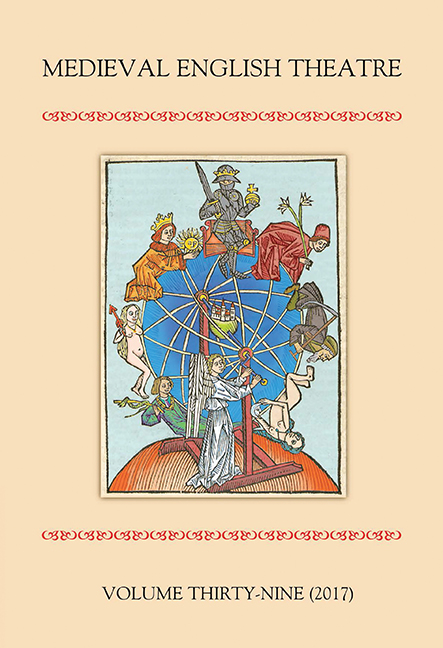Book contents
- Frontmatter
- Contents
- List of Illustrations
- Editorial
- Online Links
- Pageant-Carriage Maintenance at Chester
- Carnevale in Norwich, 1443: Gladman's Parade and its Continental Connections
- The Beccles Game Place and Local Drama in Early North-East Suffolk
- Pendens super feretrum: Fergus, Aelred, and the York ‘Funeral of the Virgin’
- George Gascoigne at Oxford
- Elizabeth Nevile's Wedding Entertainments: A Yorkshire Family Celebration in 1526 and its Contexts
- Herod's Killing of the Children in New College Chapel Oxford, 8 February 2017 (review)
- Editorial Board and Submissions
Carnevale in Norwich, 1443: Gladman's Parade and its Continental Connections
Published online by Cambridge University Press: 17 July 2019
- Frontmatter
- Contents
- List of Illustrations
- Editorial
- Online Links
- Pageant-Carriage Maintenance at Chester
- Carnevale in Norwich, 1443: Gladman's Parade and its Continental Connections
- The Beccles Game Place and Local Drama in Early North-East Suffolk
- Pendens super feretrum: Fergus, Aelred, and the York ‘Funeral of the Virgin’
- George Gascoigne at Oxford
- Elizabeth Nevile's Wedding Entertainments: A Yorkshire Family Celebration in 1526 and its Contexts
- Herod's Killing of the Children in New College Chapel Oxford, 8 February 2017 (review)
- Editorial Board and Submissions
Summary
Most of my contributions to the field of Medieval Theatre have focused on the three-way relationships between drama, folk custom and pageantry, and what follows will be no exception. This is a field in which it is necessary to supplement the limited texts and records surviving from the period itself by recourse to later (nineteenth, twentieth century), derivative or analogous folk traditions on which we are better informed – a procedure I have previously deployed extensively if cautiously, and this ‘regressive’ approach will figure here too. But it will be somewhat overshadowed on this occasion by a ‘comparative’, transnational one, since whatever their (considerable) interest and significance in their own right, continental European traditions of drama, custom and pageantry are potentially useful as further supplementing the insular evidence for a given feature.
In this regard my point of departure is the assumption that before Britain became an island in the early modern period, England was home to a local oikotype of Pan-European traditions, so that, to put it bluntly, anything they had, we had too: if the French had farces and sotties, so did we; if the Dutch had abele spelen and rederejkers, so did we; if the Germans had Fastnachtspiele, so did we. And if, at first sight, we didn't, this must be the result of different procedures of record-making, or different patterns of record survival, or different degrees of record accessibility (including strategies of record publication), or different perspectives of scholarly enquiry.
Carnival/Shrovetide
This does not always work. Although the French had well-documented nuptial charivaris in the Later Middle Ages, and the Italians the analogous mattinata, the English had nothing of the kind. But this was not insular exceptionalism – it just made us part of a European charivari-free zone which also included northern Germany and Scandinavia.
A particular challenge is the season of Carnival, which in Europe is so full of spectacular festive customs that among the unwary the term has come to mean ‘festival’ in general (particularly if it is subversive and upside-downy). For carnival in the strict sense, the festive period immediately before the beginning of Lent, the current English term is Shrovetide, which sounds altogether more respectable.
- Type
- Chapter
- Information
- Medieval English TheatreVolume Thirty-Nine (2017), pp. 35 - 76Publisher: Boydell & BrewerPrint publication year: 2018

